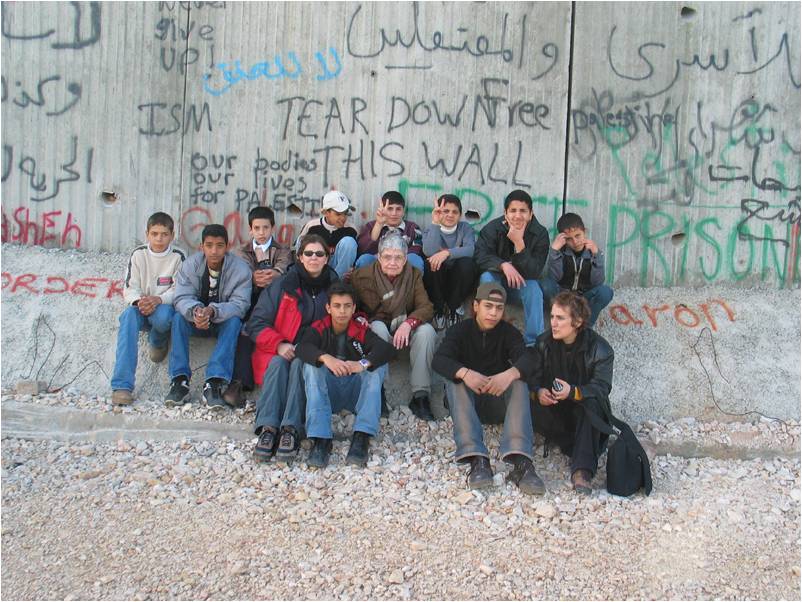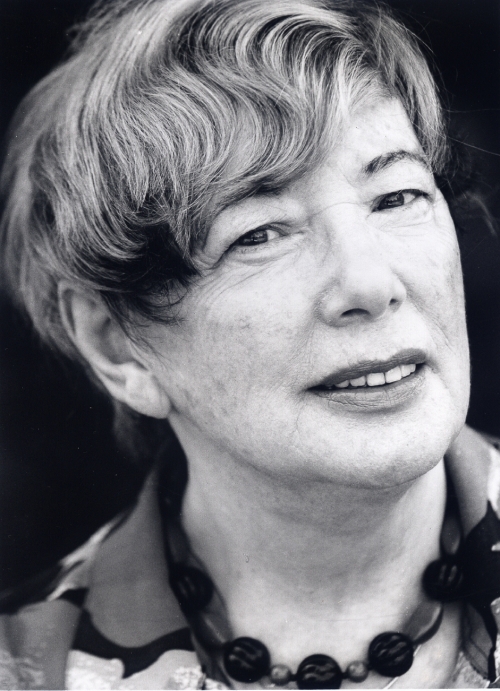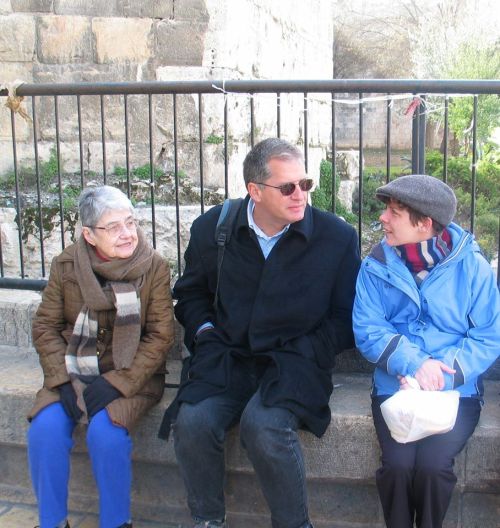
Hatred/2
by Hedy Epstein
Throughout the 1960s, I became involved in local civil and human rights activities, as well as anti-Vietnam war protests. In the spring of 1970, it became public knowledge in the United States that, as part of this war, the U.S. Air Force had been carpet bombing Cambodia for several months.
This triggered an entire set of thoughts in my head. In opposition to the war, I had picketed, marched, sent letters and telegrams to the President and to congressional representatives, yet nothing adverse happened to me or to my family. Doing this, I had neither risked my life nor that of my family. I had put neither my life nor that of my family in jeopardy.
Then my thoughts travelled across the years and across the ocean, back to Germany. I realized then, had the German people done what I did, during the Hitler regime, they would have risked their lives and perhaps that of their family. I was fully aware that there was opposition and resistance to Hitler regime by some people and that most of these people unfortunately did not survive because of it. Then I asked myself, how can I condemn an entire people for not risking their lives, when I am not sure if I would be willing to do the same? Fortunately, I have never had to risk my own life.
With that, all the old hatred, which was a part of me for decades, disappeared and has never again raised its ugly head. I would like to believe that I am better person as a result. I know I am a happier person since I no longer hate.
Being Real
No one would really confuse a Catholic Worker type with a real ghetto person, and no one would really confuse you with a real impoverished hillbilly. You may identify with them, but they do not identify with you.
–Theologian Rosemary Radford Ruether to monk Thomas Merton, mid -1960s
We may identify with Palestinians in the refugee camps
Or in Israel
Or in Gaza, the West Bank, and East Jerusalem
Or the Iraqis
The Afghans
The Pakistanis
And maybe some of them would identify with us
If they learned that we
(Like them)
Had done something that really touched the nerve
Of the powers and principalities here
And that led us to experience
(Like them)
Loss of employment
Relentless hostility
Physical harm
Imprisonment
Deportation
Death
The Salvadoran campesinos told the U.S. Jesuit priest
“We’ve enjoyed your company with us
We know what we need to do here
What you can do for us
Is go back to your country
Where the bombs are made
That fall on us
Take care of that
If you want to help us”
So he has tried
And has been in and out of prison
(Like them)
For 12 years
For denying the dictates of the Idol
For resisting the war-making state
A teammate and I were walking down a street in Rafah
We evidently stood out and people came to ask us
Why we were there
We told them we were with
The ISM
Immediately the people said with excited respect:
“Yes, Rachel Corrie
Rachel Corrie!”
Who had been bulldozed to death eight months before
With Her Own Eyes
An attorney who defended Palestinians in Israeli courts, Felicia Langer was an exemplar of accompaniment and focused, righteous indignation. In With My Own Eyes, she recounts some of her experiences in the first years of the occupation of the West Bank and Gaza. Those were the days when Israelis referred to their “benign occupation.”
Langer left Israel years ago, and lives in Germany. Here are some reflections and testimonies from this text from 40 years ago…
The Arabs preferred going to jail rather than accept the boons with which the conquerer tempted them. He destroyed their houses so that they would leave, but they went back to their ruins. He banished the sons, yet the parents refused to go. ‘We are born here, and here we’ll die’… a people that does not understand the language of force.
Walid al-Disi: “When they took me to write the confession he told me I had to write it with my own hand; I told him I didn’t want to. He threatened me with bringing my parents and putting them in prison. He threatened me with blowing up my house, as Nimri’s had been. What I wrote about the arms was written because of the beatings and the threats. The rest is true and I do not deny it. I gave myself up because they had come and arrested my father.”
Ziyad Abu Maysar: “We will not put up with the occupation and annexation of our lands, and we will not give up the right to manage our own country; we don’t want a custodian.”
A judge: “You have no idea how incited they are. That’s why I have imposed heavy fines, even prison sentences. But it isn’t enough. I tell you, the solution is entirely different. We should follow the example of Hussein’s time. When they wanted to break a demonstration, they opened fire, and that was it. One death would deter the others.” Langer: “How can you talk like that?” I asked him. I had known him for some time, but now he appeared to me in a completely different light. He was small, a major in the army. He talked like an educated man who kissed his children goodbye every morning before going to work, as did the parents of the children he had judged the night before and for whom he was now considering such drastic solutions.
Langer: “At the Damun prison the guards also tried to break the strike in a most violent fashion. They tried—on the third day of the strike, when the strikers were by then physically weak—to make them drink milk by force. But they did not succeed and the strike continued. The administrative detainees sent a memorandum to the prison authorities, demanding either their freedom or their trial. Among the detainees there were people who had been in prison for thirty months without trial.”
Langer: “All those who act proudly during their trial pay the price for it. Whoever dares to express his credo during trial, talking of his homeland, of the Palestinians, of the revolution, gets his due in prison when the sentence is pronounced.”
At his trial, Muhammad Dahman was asked by Langer: “Where are your parents from?” “From occupied Palestine, from a village near Majdal (today Ashkelon).” The prosecutor: “What do you think of the ‘Liberation Forces’ organization?” “I think every Palestinian in an occupied area should join it. I personally didn’t, but that was only because of personal reasons. Every Palestinian must defend his country,” said Dahman. “Indeed?” said the prosecutor. “Why certainly, it’s only natural, don’t you think? Just as you have your duty, I have mine.”

Standing with the Palestinians
by Hedy Epstein
I first went to Palestine as a member of the International Solidarity Movement to observe the difficult conditions of daily life under military occupation. It would have been enough to reach out and touch just one Palestinian and place my hand on her shoulder and tell her that I was with her in her pain. But I saw and did much more.
In Bethlehem, I saw a Caterpillar bulldozer ripping up centuries-old olive trees to clear a path for rolled razor wire and antitank trenches dividing the town where Jesus was born.
In Qalqilia, I was dwarfed by Israel’s separation wall rising more than 25 feet. In President George W. Bush’s phrase, it “snakes in and out of the West Bank.” It keeps farmers from their fields and hems in 50,000 residents on all sides.
In Masha, I joined a demonstration against this wall. I saw a red sign warning ominously of “MORTAL DANGER” to any who dare cross this fence. Then I saw Israeli soldiers aiming at unarmed Israeli and international protesters. One of our group was Gil Na’amati, a young Israeli whose first public act after completing his military service was to join this protest against this wall. He was shot by an Israeli soldier and I saw blood pouring out of him. I saw shrapnel lodged in the leg of Anne Farina, one of my traveling companions from St. Louis. I couldn’t help but think of Kent State and Jackson State, where National Guardsmen opened fire in 1970 on protesters against the Vietnam War.
Near Der Beilut, I saw the Israeli police turn a water cannon on our nonviolent protest. And I remembered Birmingham, Alabama in 1963 and wondered why a democratic society responds to peaceable assembly by trying literally to drown out the voice of our protest.
In his controversial book, Palestine Peace not Apartheid, former President Jimmy Carter wrote, “Israel’s continued control and colonization of Palestinian land have been the primary obstacles to a comprehensive peace agreement in the Holy Land. In order to perpetuate the occupation, Israeli forces have deprived their unwilling subjects of basic human rights. No objective person could personally observe existing conditions in the West Bank and dispute these statements.”
From this first trip, I agree with Jimmy Carter.
Seeing is believing.
Presence
by Hedy Epstein
One of the most unusual experiences of my life took place in Bethlehem in January 2004. Shortly before I left for the Israeli-occupied West Bank, I had received almost $30,000 from France as reparations for the Vichy government’s role in the deportation of my parents to Auschwitz. My goal was to divide the money among organizations that worked either directly or indirectly with Palestinian children. After some research, I sent checks to several different groups, among them Sami Adwan’s grass-root organization, before I left home for Palestine. I was in touch with Sami before leaving home and we agreed to meet when I was in Bethlehem, where he lives.
Sami treated Dianne and me to lunch in a very nice restaurant. There were lots of people there, with plenty of eating, talking, coming and going. While we were chatting, I had the oddest feeling: my parents were there in the room. I felt like they were above me, somehow, and what they went through is what allowed me to be doing what I was doing then and there in Palestine.
I never experienced my parents being present like I experienced them that day.
I’ve never believed in such things happening, but there they were, they were really there with me.
What Some People Say
Monday 1/19/2009 8:11 p.m.
Hedy Epstein, this call is from Marvin Singer S-I-N-G-E-R, 718-465-9911 regarding your appearance on Fox and, uh, I was quite impressed. 718-465-5239. Thank you.
Monday 1/19/2009 8:15 p.m.
Yes, this is again Marvin Singer, S-I-N-G-E-R. I’m calling from New York. And I saw your performance on Fox News. You filthy vermin. You should be ashamed of yourself but you don’t have any shame. You old idiot. One day we’ll come around St. Louis and I will give you my piece of mind and spit on your ugly face. I would like to see if you have any courage to respond to this. My telephone number is 718 the phone number 465-9911. Anyhow, uh, we will find a way to deal with protestors of your type. You ugly little creature.
The Way It Is
Hedy Epstein
One day we were invited into a Palestinian family’s home, where the extended family had gathered to meet us. Each of us on our delegation said a few words to the family, and they spoke in turn to us. Later, we had time for one-on-one exchanges with members of the family.
I got into a long conversation with one of the young men. He was in his early twenties. I asked him, “Do you have any dreams or nightmares?”
He replied, “I wish I would have nightmares, so I wouldn’t have to wake up to nightmares.”
Taking a Stand
These days I am thinking of two Holocaust survivors.
I met with one today: 86 year-old Hedy Epstein and I had lunch at Blackberry Cafe in Clayton. The other is receiving an honorary doctorate tomorrow at Washington University: 82 year-old Elie Wiesel, who will also give the commencement address.
Mr. Wiesel and Ms. Epstein have in common the central experience of their lives: their families destroyed by the Nazi genocide. He survived the Auschwitz death camp, and she left Germany in 1939 on a Kindertransport to Great Britain.
After the war he moved to France, studied at the Sorbonne, and eventually became a journalist and novelist. After the war, she served as a research analyst for the U.S. government at the Nuremberg trial of Nazi doctors who conducted medical experiments; she then came to the United States.
In the 1990s I spent many hours reading Wiesel’s books and writing a study of his activism in light of his Holocaust experience. In the last decade I have spent many hours with Ms. Epstein: at peace vigils, meetings, demonstrations, and as part of the International Solidarity Movement in Israel’s occupied West Bank in 2003.
Wiesel is an internationally renowned icon, advisor to presidents (Carter, Reagan, and Clinton), guide to Oprah Winfrey at Auschwitz, and author of over forty books. Ms. Epstein has been known locally for decades as a speaker on the Holocaust and also as a grass-roots activist challenging U.S. militarism; more recently, she has become prominent nationally and internationally because of her work for Palestine.
Mr. Wiesel would agree with the working title of Ms. Epstein’s political memoir, Remembering Is Not Enough. And I think that Ms. Epstein would agree with Mr. Wiesel words from his Nobel lecture in 1986 in which he critiqued neutrality and take up the cause of those who are oppressed and marginalized.
Given what Martin Luther King, Jr. once called named the imperative of responding to what is going on in the present, the crucial moral task is to refuse abstraction and embody such maxims in our specific political, economic, and cultural context.
For example, in the second volume of his 1999 memoirs, Mr. Wiesel admitted he had not done enough regarding the Palestinians, even as he stated he had not taken a public position on the conflict. He had long held that since he lived outside of Israel, he didn’t have the right to be critical of the Jewish state.The Palestinians’ situation, he claimed, nevertheless touched him.
The fact that he did not live in the Soviet Union, Bosnia, or Iraq did not stop him from speaking out about those urgent situations (he was a strong supporter of Bush’s invasion/aggression in Iraq in 2003). There is also the fact that, for over four decades, Mr. Wiesel has made the strongest, most ardent “public stand” of support for Israel, from the 1967 war to Israel’s 1982 invasion of Lebanon to its response to the intifada in the late 1980s. He forbade himself to criticize in public Israel but he certainly sang its praises and justified its actions.
Unlike the Nobel Peace laureate, Ms. Epstein has taken a public stand to oppose, not the “plight” of the Palestinians, but their oppression by Israel, steadfastly backed by the United States. Since 2003 she has made five trips to the West Bank to work with peace, women’s and solidarity groups opposed to the now almost 44year-old Israeli occupation of Palestinian lands. In East Jerusalem, Mash’a, Al’ara, Hebron, Qalqilya, and Bil’in, she has joined the Palestinians, along with Israeli activists and other internationals, in nonviolent resistance to Israel’s intensive effort to ghettoize the Palestinians and to expropriate more of their land for Jewish settlers.
She has bore witness to Israel’s massive wall, declared illegal by the International Court of Justice in 2004. She has received a very small but unforgettable taste of what the Palestinians experience every day, from being strip searched, water cannoned, tear gassed and sound bombed, as well as being declared a terrorist and security risk.
She stood face to face with the women, men and children of the West Bank and listened to their stories, memories, anguish, and hope.
In the last three years, she made four unsuccessful attempts to be one on the boats to break Israel’s devastating siege of Gaza. She is scheduled to join scores of other U.S. citizens on the U.S. boat to Gaza in late June as part of the International Freedom Flotilla II.
By her words, but much more powerfully by her actions, Ms. Epstein is saying to us, We must intervene, since neutrality only aids and abets the oppressor.
Women in Black
by Hedy Epstein
Every second Tuesday of the month, we hold a vigil of Women in Black in University City. Usually, these are uneventful. People may support us, some take our flyers and say thank you, others refuse to take them, cars may honk once in a while. Not much else happens. Cars may honk once in a while.
One time, I was handing out fliers, and a man behind me started talking to me. He asked me, “Do you know how to solve this problem?”
I said, “Well, if I knew the answer to that, I wouldn’t be standing here.”
He then responded, “Well, I know the answer: Kill all those criminals, those vermin”—I realized he was Jewish and was talking about the Palestinians. He went on and said, “Throw them all into the Mediterranean. Get rid of them all!” Then, he left.
He came back a few minutes in his car, and asked our group, “Who’s the Jewish woman here?” I said, “I’m Jewish.”
He then laid into me with barrage of hateful and nasty remarks.
Just before he drove away, I told him, “Stay human.”
He blurted back, “Yes, I am human: I’m Jewish!”

This page is part of my book, Dear Love of Comrades, which you can read here.